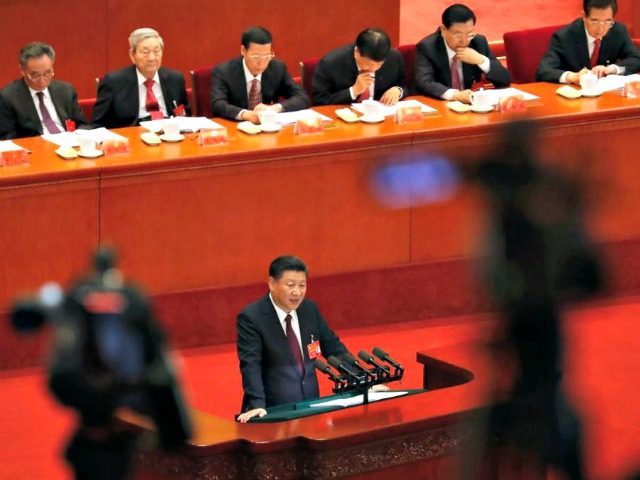Military officials told members of Congress this week that China is expanding its power and global reach by buying up foreign land and investing in developing countries.
The Communist regime’s goal, one official said, is to “win without fighting.”
“When it comes to China, the bottom line there is the checkbook,” Navy Secretary Richard V. Spencer told lawmakers at a House Appropriations Subcommittee on Defense hearing on Wednesday.
“Not only in the dollars and cents that they are writing to support their military expansion and their technological work, but what they’re doing around the globe … weaponizing capital,” Spencer said.
“Their open checkbook keeps me up at night,” Spencer said.
The Hill reported:
Spencer referred to Beijing’s current funding of a Sri Lankan port project, a move not done as aid but rather in order to secure it for themselves.
China has said the project is part of its $1.4 trillion ‘Belt and Road Initiative,’ which is meant to bolster trade routes by extending roads outside the country and building up ports.
Marine Corps Commandant Gen. Robert Neller, who also spoke at the hearing, said the Chinese “are playing the long game.”
“Their concern with human rights is not there, they’ve got big bags of cash. They’re buying airfields and ports to extend their reach … they want to win without fighting,” Neller said.
As Breitbart News reported, the Chinese plan is, indeed, global:
[One Belt One Road] is a global infrastructure project Chinese leader Xi Jinping insists is primarily concerned with recreating the ancient silk road. The “Silk Road Economic Belt” is mainly a series of land projects aimed at connecting China to western Europe, focused on building roads, railroads and stations, checkpoints, and other necessary infrastructure to improve cargo transport. The Maritime Silk Road is the sea-based analog to this project: a plan to build shipping ports throughout Asia, the South China Sea, and Africa to connect the three continents.
In February, CNN reported on China’s strategy to spend its capital to gain strongholds around the globe, including the Sri Lanka port referenced at the hearing:
Beijing invested $1.5 billion in 2010 to build the port.The venture was considered economically unviable and indeed, in the years that followed, the port sat empty and neglected, and Sri Lanka’s debt ballooned.
China’s official licensing of the port in December last year gives it yet another point of access over a key shipping route, and the prospect of providing it with a sizeable presence in India’s immediate backyard and traditional sphere of influence, bringing China closer to India’s shores than New Delhi might like.
Moreover, Sri Lanka’s decision to sign a 99-year lease with a Chinese state-owned company for the Hambantota port to service some of the billions it owes to Beijing has some observers concerned other developing nations doing business with China as part of China’s One Belt One Road initiative might fall into similar financial straits.
“China is, in many cases, the only party with the interest and the capital to deliver on these projects,” Jeff Smith, a research fellow on South Asia at the Heritage Foundation in Washington, D.C., told CNN. “The relevant question for everyone is: at what cost?”
“By 2015, Sri Lanka owed China $8 billion, and Sri Lankan government officials predicted that accumulated foreign debt — both owed to China and other countries – would eat up 94% of the country’s GDP,” CNN reported.
And as Breitbart News has reported, China’s expansion of holdings includes Iraq:
China has been pushing to invest billions of dollars in Iraq’s energy infrastructure, especially Iraq’s oil fields.
Iraq is strategically important to China’s government, military, and the “One Belt, One Road” grand strategy that supposedly will link everything in Europe and Asia to China by 2050. Any relationship in the Middle East is important to China also because of China’s enormous thirst for imported oil.
China is the world’s biggest importer of oil. Any shortage of oil in China could trigger a hard recession in China and lead to unrest. Iraq represents a major opportunity to increase the flow of oil imports.
Breitbart News also reported on Chinese investment in Africa:
China is employing “neo-colonialism” tactics in Africa in the form of predatory loans collateralized with natural resources and strategic assets, experts cautioned lawmakers on Wednesday.
The loans allow Beijing to strengthen its military ties to the continent, enhance political leverage, export communist authoritarian ideology, and gain access to viable army positions that can threaten the American homeland
In written testimony prepared for a House Foreign Affairs Subcommittee on Africa hearing on Wednesday, author Gordon Chang, an expert on China, declared: “I conclude that [President] Xi Jinping, the Chinese ruler, believes his country should be the world’s only sovereign state, which is the essence of colonialism, and that today his country’s relations with Africa resemble a new form of colonialism.”
“Moreover, I believe Xi’s ambitions for Africa, however one characterizes them, threaten America,” Chang said.
Secretary of State Rex Tillerson has also weighed in on Chinese ambitions in Africa, most recently at a speech at George Mason University.
Tillerson warned African states to refrain from incurring too much debt from creditor China, which could “encourage dependency” and undermine their sovereignty.
Follow Penny Starr on Twitter.

COMMENTS
Please let us know if you're having issues with commenting.